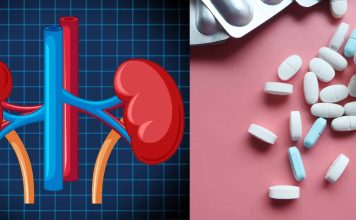Table of Contents
Overview
Iron and vitamin D deficiency may cause Restless leg syndrome. Conversely, taking iron supplements and vitamin D may improve the RLS.
Iron deficiency is a principal cause of Restless Leg Syndrome (RLS). The doctors do tests to measure your body’s iron levels, and if the amount is lesser than the normal value, they will prescribe you iron supplements.
Vitamin D is important for bone health. Vitamin D deficiency can hamper the recovery of Restless Leg Syndrome (RLS). Taking vitamin D supplements may help you with RLS.
What is restless leg syndrome?
Restless leg syndrome is a condition that is characterized by an uncontrollable extreme urge to move the legs that are only relieved by moving the legs.
The restless leg syndrome is characterized by an uncomfortable sensation on the leg that occurs specially and more frequently at night. It may also occur when the person is lying or resting.
The restless leg syndrome can occur at any age in males and females. It disrupts sleep, or the person may not sleep due to this unintentional urge to move his leg.
Moving the leg relieves the symptoms temporarily. However, often this condition is severe, and the person cannot sleep for several days.
There are some home remedies and clinical treatments to cure these conditions.
Restless Leg Syndrome (RLS) Symptoms
The symptoms of restless leg syndrome are common and are similar for almost every person. Most commonly, there is an urge to move the leg, which can manifest as;
- Tingling sensation on the leg while lying down or resting
- Moving the legs relieve this uncomfortable sensation
- These uncomfortable feelings occur mostly at night while the person is trying to sleep
- It can wake up a person from sleep, especially late at night
This uncomfortable sensation is often described by the patient as;
- Creeping
- Pulling
- Tingling
- Itching
- Electrical
- Crawling
- Aching
Restless leg syndrome is usually a painless condition. So, the patients do not describe this sensation as pain.
The most common symptom of restless leg syndrome is an uncontrollable urge to move the leg, which relieves by moving the leg temporarily.
Restless Leg Syndrome (RLS) Causes
It’s hard to determine the exact cause of restless leg syndrome. However, it is believed that the condition can be neurological, psychological, or manifested along with some diseases and conditions.
Common causes of restless leg syndrome may include;
Family History
Restless leg syndrome often runs in the family members. Many family members can experience the symptoms of RLS at any age in their lives.
Pregnancy
Pregnancy can be another cause of restless leg syndrome. Pregnant mothers often complain of a tingling sensation in the leg that is relieved by the movement of the leg.
In a pregnant mother, it easily occurs when they take too much rest and detach from normal households works.
The prevalence of RLS is more common in the last trimester of pregnancy.
Some risk factors may associate with RLS.
Risk Factors
- Old age: although the RLS can occur at any age, it occurs mostly in older persons, more specifically, over 40 years.
- Sex: it can occur in both males and females, but it occurs mostly in females
- Obesity: overweight and obese people are more likely to experience RLS.
- Peripheral neuropathy: damage or compression of nerves that supply the leg may cause RLS. Then RLS is more likely to occur in the person with diabetes Meletus.
- Iron deficiency: iron deficiency is one of the prime causes of restless leg syndrome. If there is an iron deficiency, the doctors prescribe iron supplementations.
- Kidney failure: in kidney failure, the body fluid mechanism does not work properly. It may lead to RLS.
- Parkinson’s disease: in Parkinson’s disease, the limbs may become hyper-excited, leading to RLS.
Complications
There isn’t enough data about the complication of restless leg syndrome. However, the restless leg syndrome may cause sleep
Disturbances and that may lead to some complications, such as
- Depression
- Anorexia
- Nausea
- Headache
- Lack of concentration
- Day time drowsiness
- Impaired skill
- Behavioral change
If the RLS is a consequence of any other disease, then that disease may also cause some complications.
Home Remedies
There are some home remedies for restless leg syndrome. However, there is not much scientific evidence supporting these remedies, yet they may help you to get temporary relief.
- Hot water bath: dip your boat lex in warm water for some time. It will increase blood supply to your leg and may help temporarily relieve the symptoms.
- Cold compression: applying ice packs or cold compression to the lower limbs may help reduce the limb’s sensation.
- Quality sleep: Having a quality sleep and maintaining sleep hygiene is important to prevent RLS. Try not to take tea, coffee, or other exciting components in the evening. Sleep in a quiet environment with a calm mindset.
- Workout: the prevalence of RLS it’s high in those people who are physically inactive. Workout regularly helps to maintain proper blood circulation in your legs and have stronger legs.
You may try some foot wrap or vibrating pad designed for the foot. These products keep vibrating, maintain the blood supply, and help relieve restless leg syndrome symptoms while you are sleeping.
When to see a doctor?
Most of the time, people do not take their restless leg syndrome seriously and do not seek any medical attention. However, you may try some home remedies to relieve these symptoms.
If restless leg syndrome affects the quality of your life and hampers your daily lifestyle, you should consult a physician to get proper treatment.
Treatment
The doctors use some specific targets to treat restless leg syndrome, such as;
- Dopamine agonist: Pramipexol or other dopamine agonists are most commonly used to treat RLS. They increase dopamine activity in the brain and help to relieve the symptoms of RLS.
- Iron supplementation: if RLS is caused by iron deficiency, the doctor may prescribe iron supplementation to cure your condition.
- The doctor may also prescribe GABA agonists.
- The doctors often prescribe sleep medications that increase NREM sleep duration and help relieve RLS.
Prevention
There is no specific data about the prevention of RLS. But there are some risk factors that you may control to prevent the prevalence of RLS.
- Loss of some weight: if you are overweight or obese, you should get rid of the extra weight. Obese persons are more likely to be affected by RLS.
- Exercise regularly: Physically inactive persons are more vulnerable to RLS. Exercising regularly may help you to prevent RLS.
- Maintain sleep hygiene: sleep at a particular time every day, and don’t take caffeinated products before sleep.
- If you are a diabetic person, control your blood sugar.
- Take a test to measure your body’s iron level, and take iron-containing foods to maintain the proper iron level of the body.
Takeaway
Restless leg syndrome is a common and treatable condition. It manifests as an uncontrollable urge to move the leg while the person is resting. It is only relieved temporarily when they move their legs.
Some home remedies may help to relieve the symptoms temporarily. However, if it affects daily life, one should consult with their doctor to get rid of RLS.
Frequently Asked Questions (FAQs)
Who treats restless leg syndrome?
Doctors treat RLS in a specialty called physical medicine.
What tea is good for Restless leg syndrome?
RLS is aggravated by taking coffee/tea before going to sleep. It’s better not to take tea/coffee at least 3 hours before going to sleep. Green tea is preferable.
What foods cause restless leg syndrome?
Stimulant foods such as coffee and tea may aggravate RLS. Often sugars are considered a stimulant.
Last Updated on October 18, 2022 by Learn From Doctor Team






